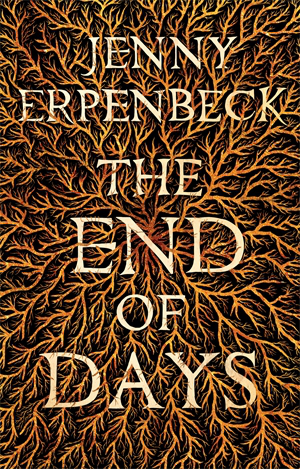 The End of Days · Jenny Erpenbeck · 2012
The End of Days · Jenny Erpenbeck · 2012
Susan Bernofsky translation · Portobello, 2014 · 238 pages, hardcover
♠
The End of Days is a gray novel, and Jenny Erpenbeck’s writing is a dirge for the people of 20th century Central Europe. She gave the Galician woman at the center of her novel five lives (or rather, she gave her one life with five possibilities for her death, asking after each death what would have come of her had she lived a little longer).
The 20th century contained in it both the Austro-Hungarian Empire and such a distinct thing as reunified Germany. And of course, there was everything in between. Each grave dug is dug from a life fashioned by this same Europe.
Her Galician woman (Erpenbeck didn’t give any of her characters names apart from epithets – mother, daughter, husband, the goy, the civil servant of the eleventh pay grade, Comrade H…) dies as an eight-month-old in fever; she dies as a 20-year-old suicide in heartache; dies as a body that fills a Soviet quota; dies as a widow and writer who falls down her own stairs; dies as an old woman in an old people’s home in a reunified Germany.
The day room is full of stories not being told.
Erpenbeck’s writing is elegiac, and her Galician woman is given in death the same insubstantiality as the ashes.
What did this Europe hold for a girl born to a Jewish mother and Catholic father? What about for a woman from a country no longer in existence and now living in one that also will fail to be? “East” and “West” are more than directional.
The End of Days is a barren novel with thatched roofs and bitterly cold winds and waiting at midnight for something to eat at daybreak. It has its basis in the tremors of an earthquake: how it’s felt long after its wrench and far from its center, how it insinuates itself into the littlest things like a hairline crack in a distant ceiling. Her novel starts in the Galicia of Eastern Europe at the fin de siècle and ends in a Berlin old people’s home after the fall of the Berlin Wall.
The aftereffects of two wars, of starvation, disease and playing a peon in the center of Cold War chess, reverberate throughout Erpenbeck’s novel, showing up (ah, it’s what husband calls the “primeval tongue” – that language that communicates via visible indicators like gray hairs or sallow, sunken cheeks) in her characters and in the sentences she writes.
These sentences are an interesting exercise in prose. They’re written on a plane that’s as fragile as fiberglass and with the same rarifying quality. It’s peaky and breathless in a faint sort of way – commas are used where periods ought normally to be, and the sentences run close behind each other, clawing at and butting into each other as if trying to keep up and keep from being torn apart. (So many in her family have left – were arrested; died.) What might have been a nuisance for us as readers and a pretension on her part instead provokes empathy: it’s the same desperation her characters endure.
At other points her writing feels cinematic with the short, choppy fragments that relay an ordinary thing or action, much like an extra tight shot in a movie tries to bring its images in line with how our brains process what our eyes and ears are communicating to us.
♠
A day on which a life comes to an end is still far from being the end of days.
Our own personal fates cannot be altered. After our deaths there are yet others who live on to eat the fruit we bought that has not yet ripened. The End of Days balks at the idea that a life could contain Auschwitz and Stalin’s show trials as parts to its history while also giving space to a market that offers thirty kinds of cheeses.
The Galician woman is a dead infant girl at the start of Erpenbeck’s novel. She’s a 90-year-old woman with dementia at its end, and somewhere in the middle she’s also a whore, a daughter to a man who left his family behind, a celebrated Communist writer, a dangerous Communist writer (always this back-and-forth), a wife (widow) to a man who fills a quota.
Thirty kinds of cheeses looks a little too much for her. It’s very Good Bye, Lenin!
Erpenbeck pulls child’s memories through to the end of her novel – the memories that the heartbroken girl had of a class where her work was deemed sloppy and shoddy, for instance, or the words her grandmother spoke when she moved to Vienna, or a small box with the golden buttons of a civil servant’s uniform – and she writes always in the present tense, giving her story a constant immediacy that allows 1900 to butt up against 1990 and for Kaiser Wilhelm to proffer his hand to Helmut Kohl.
The End of Days is a gray, ragged novel; we might even say sloppy and shoddy if it weren’t for Erpenbeck’s constant attention to the edges of her story: it’s a story that could easily have run away from her with unfinished hems and trailing tatters that connect to nothing. But Erpenbeck knew how far to push the life she wrote and knew when to ground her words so that they always said something and never became unreadable pretension. The End of Days is a gray, ragged novel and it ought to be so: the history it gives is a gray, ragged history that can’t quite be pinned down.
♠
The End of Days · Jenny Erpenbeck · 2012
Susan Bernofsky translation · Portobello, 2014 · 238 pages, hardcover





